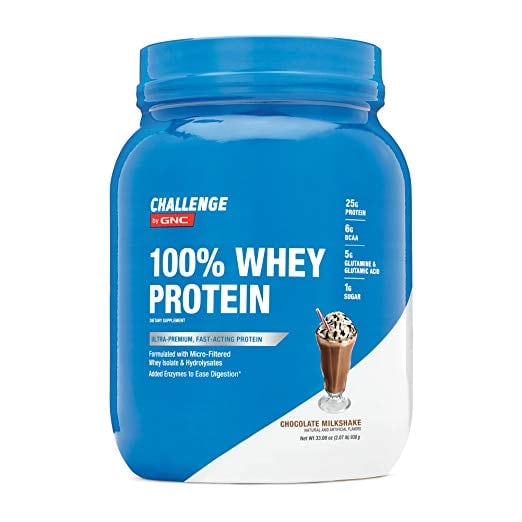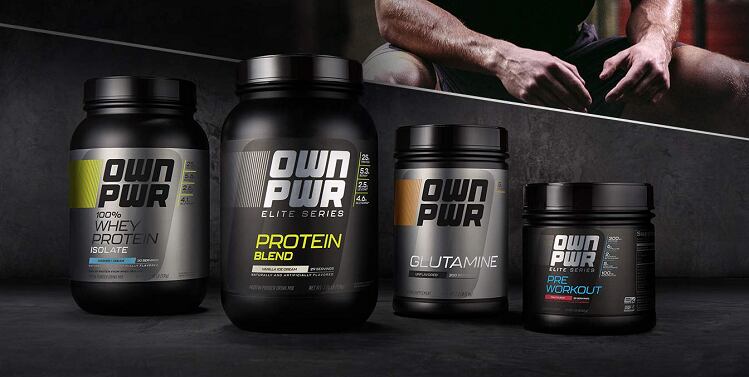Without much fanfare, Amazon launched a handful of private label sports nutrition brands. To date, this includes Enraged Nutrition, Flexatarian, P2N Peak Performance Nutrition, and most recently launched OWN PWR in the US. In Europe, Amazon has Amfit.
These brands offer the typical supplements found in a sports nutrition brand’s line, from multivitamins to pre-workouts to plant-based proteins and even a ‘testosterone catalyst’, all featuring ‘masculine’ branding like dark colors and bold typefaces.
Analysts we spoke with said that it’s still too early to assess how Amazon’s brands are performing, what consumer sentiment is toward these brands, and how they compare to legacy sports nutrition brands. But they did share some tips on how to navigate the space now that a gorilla has entered the room.
Amazon private label vs. Amazon ‘exclusive brand’
Important to note is that not all products listed as ‘Our Brand’ on Amazon are private label brands, explained Justin Smith, founder of TJI Research, a research firm specializing on the business of Amazon.
The e-commerce platform also calls brands exclusively sold on its site but not conceived and marketed by Amazon staff as ‘Our Brand,’ “though the way it labels these differs throughout its site and apps,” Smith told us.
TJI Research’s primary methodology on assessing a brand’s connection to Amazon is by looking through trademark records provided by the US, UK, and Indian governments.
By this methodology, OWN PWR is technically the only private label sports nutrition brand, while the others are exclusive to Amazon. Also an exclusive brand is Challenge by GNC, which was launched earlier this month.
“Amazon wants to increase the number of exclusive brands it offers because Amazon hopes this will lead to increased customer loyalty over time,” he said.
“With an ever-increasing number of ‘microbrands’ launching these days, Amazon is betting that customers who find quality products on Amazon that they can’t get anywhere else will become more loyal to Amazon and spend more on Amazon over time because of their loyalty to the private brands they find on Amazon.”
Amazon did not respond to NutraIngredients-USA's requests to comment for this article.

Why should it matter?
From electrical cords and Dutch ovens to bed sheets and batteries, Amazon has stamped its name on a plethora of products. For some categories, like batteries, Amazon controlled a whopping 94% of the approximately $113 million in online battery sales, AdAge reported in 2016, citing data from e-commerce research firm 1010data.
That year was around the time Amazon started really ramping up its private label endeavors. Aside from more expensive gadgets like the Kindle or Echo (familiarly known as ‘Alexa’), its private label products have been coming and going relatively under the radar starting in 2009.
Tech news website Recode reported that 2017 was the turning point when Amazon finally went on “a private-label rampage.”
Thus, when Amazon enters a new category, it’s common for existing players in that space to shudder—after all, the e-commerce giant has greatly disrupted retail, bearing the blame of many legacy retailers closing their doors.
“If you're a manufacturer, it's never good to hear that Amazon has released private label in your industry. Amazon owns the dominant platform in the industry and has the scale, means and access to consumer data to make a credible push in sports nutrition, much as they did in 2017 with OTC private label,” Matthew Oster, head of consumer health at Euromonitor International, told us.
Amazon’s access to consumer data, and that of the vendors that sell on its platform, is subject to an ongoing probe by the European Union’s antitrust regulators exploring whether or not this gives the company an unfair advantage such as, say, knowing what categories have brand-loyal shoppers.
Amazon's luxury: Trial and error with not a lot of consequence
“It’s more of a surprise they have pre-workouts and creatines, as whilst they are traditional products in the sports nutrition space, they don’t have the mass market appeal that protein powders or even BCAAs have,” said Thomas Morgan, market analyst for sports nutrition at Lumina Intelligence (which is owned by William Reed Business Media, publisher of NutraIngredients-USA).
But Amazon’s unparalleled access to the data of players in the category also gives it unmatched luxury for trial and error without a lot of financial consequences, meaning that it can take risks with market testing products.
"[Amazon has] the benefit of scaling back and going with the brand that's most successful; unlike most companies, they have the luxury of trying this out for a while and making mistakes along the way.”
- Matthew Oster, head of consumer health at Euromonitor International
“The downside for Amazon is that their own-brand products will be competing with other products on their own site, who already have much more a brand presence, so for example Optimum Nutrition from the start will outrank in number of reviews,” Morgan added.
“It's interesting that Amazon has quietly released a handful of private label sports nutrition brands in 2018 without much fanfare,” Euromonitor’s Oster said.
“It's likely that they're testing the waters and gathering data to see which catches on. This is consistent with how they have introduced private label brands in other industries in the past. In this case, they have the benefit of scaling back and going with the brand that's most successful; unlike most companies, they have the luxury of trying this out for a while and making mistakes along the way.”
Sports nutrition shoppers are more brand loyal
Amazon hasn’t always won in the private label space, though. Apparel brands make up 88% of all Amazon private label brands, but only 1% of all private label brand sales, Bloomberg reported this week, citing a report by Jungle Scout, a data-research firm for merchants on Amazon.
This may be because shoppers care more about the brands of their clothes than the brands of their batteries, hinting a pattern that may offer sports nutrition brand owners a chance to play against a category Goliath.
Interested in Sports Nutrition?

The inaugural NutraIngredients-USA Sports Nutrition Summit, in association with the International Society of Sports Nutrition, will bring together leading scientists, brands and retailers, market analysts, and innovators in a unique, market-leading face-to-face event.
The key themes of this event include: The “size of the prize”; Positioning and differentiation; Sports nutrition and the military - product use survey data and enhancing the performance of Warfighters; The State of the Science: Sports, fitness and exercise Nutrition; Sports Nutrition products and Elite Athletes; and more!
“Sports nutrition is a unique industry in terms of consumer engagement, so Amazon has to be careful about how they position these new brands,” Oster said.
Sports nutrition consumers are looking for results and transparency in ingredients, he added, and they heavily scrutinize brands that they use and they are very vocal about brands that they feel are ineffective, overly hyped or misleading.
“Additionally, sports nutrition customers are very loyal, and it would take a strong product to dislodge them from their current preferences. Given these factors, if Amazon's play is purely around price, that likely won't be good enough in this industry.
“What's more likely is that Amazon has researched ingredients suppliers and have sourced products that can compete based on ingredients while at the same time being very competitive on price. If that's the case, it's likely that Amazon could be successful, but it's not a slam dunk as with other health and nutrition products where price is a central factor in purchasing decisions.”
Bringing attention to the whole category
One upside to Amazon entering the sports nutrition category is the attention that it brings to the whole space, according to Anna Henriksen, marketing analyst at One Click Retail.
“While Amazon does present competition to other existing brands in the category (especially smaller ones), this isn’t necessarily a bad thing,” she said.
“Amazon private label brands possess high visibility on Amazon’s platform and therefore serve as a means to drive consumer traffic not only to these private labels, but also to other brands in the same category.”
This is evident in the grocery space, she added. “When Amazon started selling the 365 Everyday Value brand on site, this drove consumers to the Amazon Fresh site. Many of these consumers came to purchase grocery items from the 365 brand, but also purchased grocery items from other online brands. Therefore, the increased traffic due to private brands can benefit all brands in a category,” she said.
“Amazon private brands may be a competitor to the other brands but, as the largest online retailer in the US, Amazon is also one of their most important partners in the e-commerce space. As its private label brands grow, it is up to the retailers to evolve their strategy around benefiting from the awareness that Amazon private labels draw to their category."

